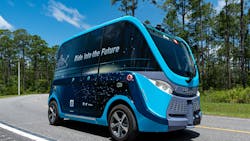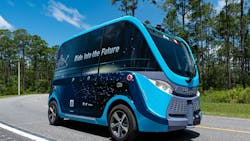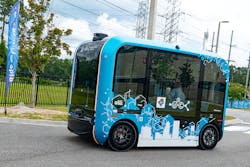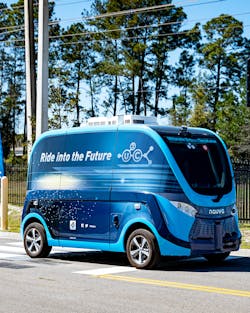JTA, FSCJ are looking to the future with AV partnership
As technology continues to evolve in the 21st century, Jacksonville Transportation Authority (JTA) is looking to lead the way in what public transportation will look like in the future.
In 2020, the authority inked a memorandum of understanding (MOU) to expand JTA’s autonomous vehicle (AV) Test & Learn program on Florida State College at Jacksonville’s (FSCJ) Cecil Center Campus, home to the college’s Aviation and Commercial Vehicle Driving facilities. The goal of the program is to test JTA’s AV vehicles on the campus to eventually be used throughout downtown Jacksonville.
The AV vehicles run on an automated people mover called the Skyway System, a 2.5-mile track in downtown Jacksonville. JTA has had driverless vehicles operating in Jacksonville for approximately 25 years on the Skyway System. The authority plans on converting the skyway to a roadway at elevation, allowing the AVs to operate without drivers to expand mobility options throughout the city. The vehicles are electric and will be charged at FSCJ’s Cecil Center Campus.
The project is one of many planned “Agile” programs pioneered by the JTA team to prepare the Jacksonville community for the future of transportation through the Ultimate Urban Circulator (U2C) program. Phase one of the U2C Bay Street Innovation Corridor is set to launch in 2025.
JTA CEO Nathaniel P. Ford Sr. says the decision to partner with FSCJ came down to both partners sharing a vision developing AV technology and JTA wanting the younger generation to embrace the new form of transportation.
“From the very beginning of this project, we recognized this new technology was going to be vastly different than what we've operated in the past, so we recognized that there was going to be a need for workforce development of the JTA workforce,” Ford said. “We also recognized that we needed an opportunity to do more research and testing, and we had to really look at the workforce of the future and how do we use our local state college to help us with developing the curriculum to train our technicians of the future. FSCJ’s primary responsibility was to develop the workforce of the future for the JTA and we needed a facility for additional research and testing. We wanted another testing facility with a faster and larger route and, in partnership with FSCJ, we developed a curriculum for their students.”
Ford says there will be attendants on-board the AV’s when phase one launches.
“The plan is to have attendance on the vehicle, and that is going to be for probably the next 12 months after we launch. After that, we do want to transition into level four operation that is with no attendant on the actual vehicle,” Ford said.
Ford notes the agency will have a control center that will be able to monitor all the AV vehicles in JTA’s operation.
“There will be camera’s inside and outside the vehicles for the staff in the control center to monitor the operation and monitor vehicle performance,” Ford said. “Currently, we are testing out at this particular time, teleoperation, where an actual controller could take over the vehicle and remotely operate that vehicle past any obstruction or any particular issue the vehicles may run into within the three-mile system. As we develop this technology, we are developing the technology without a person on board, so we have to make sure all of the security capabilities, as well as customer service amenities are well in place, and we're able to monitor those on a real time basis.”
In 2020, FTA started using the AV vehicles to transport COVID-19 tests from Mayo Health Clinic in Jacksonville. The vehicles transported COVID-19 test samples from the drive-through testing facility to the testing laboratories a mile away from the drive-through testing site. JTA did so for nearly four months, moving approximately 30,000 test samples.
Ford noted the authority received worldwide feedback regarding the use of AVs during the height of the pandemic, including an ITS World Congress Award for the utilization of the AV technology to help support the community related to recovering from the pandemic.
“We received great feedback for that program at the international level, at the national level and at the local level,” Ford said. “I would argue at the local level, it actually garnered greater support for the development of the AV project.”
In terms of fare collection on the AV’s, JTA plans to collect fares through a tap fare reader and have customer service personnel verify a rider has paid their fare. The strategy for implementing fare collection is still in the developmental phase.
In mid-October, JTA is planning to launch an AV test system one-mile route on FSCJ’s campus. The test system will feature two AV vehicles, both purchased by FSCJ. The route will connect some of the college’s administrative offices, the cafeteria, some of the recreational areas and some of the academic buildings on campus.
There will be an attendant on board to assist with questions and to address any issues during the operation. The test is being done to familiarize the students and the faculty with the vehicles, as well as give campus guests the opportunity to be exposed to the new technology. JTA and FSCJ will use feedback from the test route that will be implemented into the final design of the Bay Street Innovation corridor.
The JTA has begun a series of webinars that it is hosting in partnership with public transportation agencies around the country who are working with AVs. Some of the agencies JTA has done webinars with include Contra Costa County Transit, Regional Transportation Commission of Southern Nevada and Metropolitan Transit Authority of Harris County.
In the next decade, JTA is hoping the AVs lead to better mobility in the Jacksonville area.
“We have a unique situation here in Jacksonville with the Skyway and the ability to the system to replace the aging skyway,” Ford said. “Right now, we have 16 ready ride zones that we operate that are smaller shuttles, door-to-door service. We believe that that is where autonomous vehicle technology over the next 10 years has its greatest potential, that first mile, last mile mobility type hubs where we use fixed route bus service, our BRT operation, to create mobility hubs in each of those major stops and stations that are then complimentary partnered with autonomous vehicle shuttles for first mile, last mile microtransit type of operation.”
Phases of the U2C Bay Street Innovation Corridor
- Currently at 60 percent design. It will reach 90 percent design and JTA plans to break ground and begin construction in December 2023. JTA has a 2.5-year timeline for phase one. By mid-2025, JTA plans for phase one to be in service.
- Currently in requests for procurement stage. During phase two, JTA will be evaluating proposals to convert the existing aerial monorail system from a 2.5-mile aerial structure that supports the monorail operation to a roadway at elevation. JTA expects phase two to be completed by 2030.
- The extension of the three-mile route into outer neighborhoods. Phase three will occur concurrently with phase two. During phase three, JTA will be looking at deploying similar outdoor door-to-door microtransit type operations in some of its less dense neighborhoods. Phase three will feature staff on the AVs.
- No JTA staff on board the AVs and the continued extension of door-to-door microtransit options to more neighborhoods in Jacksonville by 2035.
About the Author
Brandon Lewis
Associate Editor
Brandon Lewis is a recent graduate of Kent State University with a bachelor’s degree in journalism. Lewis is a former freelance editorial assistant at Vehicle Service Pros in Endeavor Business Media’s Vehicle Repair Group. Lewis brings his knowledge of web managing, copyediting and SEO practices to Mass Transit Magazine as an associate editor. He is also a co-host of the Infrastructure Technology Podcast.




